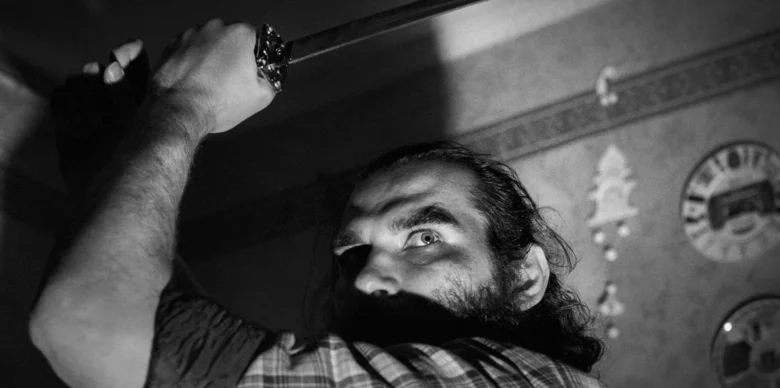In a joint collaboration between producers from Denmark, France, Ukraine and the United States, Olivier Sarbil’s documentary Viktor, screened at the DC/DOX Film Festival, granted the audience a glimpse into what it’s like living in the midst of one of the worst conflicts in Europe since World War II as a young, deaf person.
As Viktor, our titular subject living in Kharkiv, watches an old Japanese movie about samurais with his mother in their living room, the atmosphere of familial warmth shields the outside ongoing violence in Ukraine.
Viktor has a passion for photojournalism, arms, and samurais. He lives with his mother while he tries to navigate his place in the war. Viktor’s father, who passed away before the events of the film, instilled in him a love for old Japanese tales about warriors and swords. Viktor dreamt of fighting for his homeland of Ukraine, defending it in the face of Russian aggression. But as a deaf man, the army denies him the opportunity to fight.
Shot in black and white, the film utilizes elaborate sound designs to mimic Viktor’s hearing impairment—he is only able to hear with a very limited capacity through the use of hearing aids. However, his passion for photojournalism landed him a position as a volunteer photographer for the Ukrainian army, where he was able to follow them through missions and capture the experiences of the soldiers in the war.
In a Q&A panel after the screening, Viktor, Sarbil, and producer Brendan Naylor took questions from the organizers and the audience. Viktor participated through sign language, with two interpreters for Ukrainian and English sign languages.
Viktor shared with the audience what he thought the central message of the film was.
“You know, there are people who do something because they’re forced to do it and there are people who do it out of passion—to do something just from a place of passion, and I relate to the second. You know, I do everything with passion. So for me it was very important to be involved in some capacity, whatever that was,” Viktor said.
Viktor added that while he was not allowed to participate in the war as a soldier alongside hearing soldiers, the message is not so much that you have to be one thing, but it is in reality about finding your passion. Sarbil noted that he thought it took immense courage and bravery for Viktor to have volunteered as a deaf person. As someone who is also partially deaf, the film also presented a personal issue for Sarbil.
“Something that’s special about how Olivier works is he’s truly a one man band,” Naylor said. “It’s him and his field producers/tripod holder/fixer/driver. Olivier is doing sound. He’s shooting. He’s doing everything, which allows for this level of intimacy with his contributors, but also working in a war zone enables him to be incredibly nimble. You know, I think at the beginning of the shoot we had security detail with you and like [you said] ‘You’ve gotta get them off my back’ Iike, you know, ‘I have better instincts than these guys, and I’ll be able to move safer on my own.’”
Sarbil said while the cinematography was cinematic, he didn’t plan for it to unfold in that way beforehand.
“That special relationship with my contributor that really allowed me to have a very organic approach, for example, for the black and white sense of the world, they decided to shoot it in black and white,” Sarbil shared. “Just really staying in his space and putting the camera on a tripod and waiting to have the action happening on the lens rather than to rush [with a handheld camera].”
“My intention was to also show that deaf people are capable of producing work that [is], you know, better or as good as or better than anyone else,” Viktor said, “and so, I wanted to be proud of the work that I did and I wanted to display it in a way that would would basically show what I was experiencing throughout that—the experience of the war and filming of the events of the war and just to show the genuine experience. So really what I was doing was living my life and all of you were just following me around.”
The DC/DOX Film Festival showcases different documentaries in Washington, D.C. to foster collaboration and celebrate documentary filmmaking globally. The event occurs each year in D.C. over four days in June.
